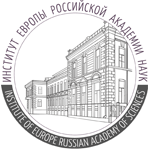institute of europe
the institute of europe of the russian academy of sciences
“Approaches of the European Union and Russia to Transnational Security Challenges”
- 25 May 2018
On May 24-25, 2018, Olga Potemkina, the Head of the European Integration Division, took part in the Jean Monnet Project Conference “Approaches of the European Union and Russia to Transnational Security Challenges”, which was hosted by the Lobachevsky University of Nizhny Novgorod. This event concluded the implementation of two Jean Monnet projects based at the Faculty of Law, Lobachevsky University: Jean Monnet Project “EU Approaches to Transnational Security Challenges: Focus on Policy Learning” (EUSECU-POLE, 2016-2018) and Jean Monnet Module “The European Union as a Global Human Rights Actor” (EUGLOBE, 2015-2018) co-funded by the European Commission. Both projects are coordinated by Andrey Leonov, Senior Lecturer at the Faculty of Law. The conference was organized by Lobachevsky University in cooperation with the University Paris-13 (France).
The conference that gathered more than 50 participants included a post-graduate workshop (24 May 2018), plenary expert sessions and a round table (25 May 2018).
The post-graduate workshop brought together PhD students doing research in law, politics and policies of the European Union and its Member States. The Programme Committee selected ten participants from leading universities: Graduate Institute of International and Development Studies (Geneva, Switzerland), KIMEP University (Almaty, Kazakhstan), Diplomatic Academy of the Ministry of Foreign Affairs of Russia, Moscow State Linguistic University, Moscow State Institute of International Relations (MGIMO University), Kazan Fede On May 24-25, 2018, Lobachevsky University of Nizhny Novgorod hosted the Jean Monnet Project Conference “Approaches of the European Union and Russia to Transnational Security Challenges”.
The plenary sessions provided a platform to discuss how the European Union and Russia approach core transnational security challenges: terrorism, human trafficking, irregular migration, radicalization, cybercrime, etc. Participants paid particular attention to opportunities for Russia and the European Union to share experience and exchange best practices of countering trans-border security threats. Key speakers of the Roundtable “Research in and Teaching of European and International Law:
Problems, Prospects and Development of Interdisciplinary Cooperation” addressed a set of questions focused on research and teaching in the area of European and international law at university level. Participants discussed key issues in this field, analysed prospects for disciplinary development of European law in Russia, its relationship with other branches of law and other social sciences, as well as possible ways of creating and strengthening interdisciplinary links and research collaborations for development of European studies in Russian universities and research institutes together with their partners abroad.
The conference that gathered more than 50 participants included a post-graduate workshop (24 May 2018), plenary expert sessions and a round table (25 May 2018).
The post-graduate workshop brought together PhD students doing research in law, politics and policies of the European Union and its Member States. The Programme Committee selected ten participants from leading universities: Graduate Institute of International and Development Studies (Geneva, Switzerland), KIMEP University (Almaty, Kazakhstan), Diplomatic Academy of the Ministry of Foreign Affairs of Russia, Moscow State Linguistic University, Moscow State Institute of International Relations (MGIMO University), Kazan Fede On May 24-25, 2018, Lobachevsky University of Nizhny Novgorod hosted the Jean Monnet Project Conference “Approaches of the European Union and Russia to Transnational Security Challenges”.
The plenary sessions provided a platform to discuss how the European Union and Russia approach core transnational security challenges: terrorism, human trafficking, irregular migration, radicalization, cybercrime, etc. Participants paid particular attention to opportunities for Russia and the European Union to share experience and exchange best practices of countering trans-border security threats. Key speakers of the Roundtable “Research in and Teaching of European and International Law:
Problems, Prospects and Development of Interdisciplinary Cooperation” addressed a set of questions focused on research and teaching in the area of European and international law at university level. Participants discussed key issues in this field, analysed prospects for disciplinary development of European law in Russia, its relationship with other branches of law and other social sciences, as well as possible ways of creating and strengthening interdisciplinary links and research collaborations for development of European studies in Russian universities and research institutes together with their partners abroad.




